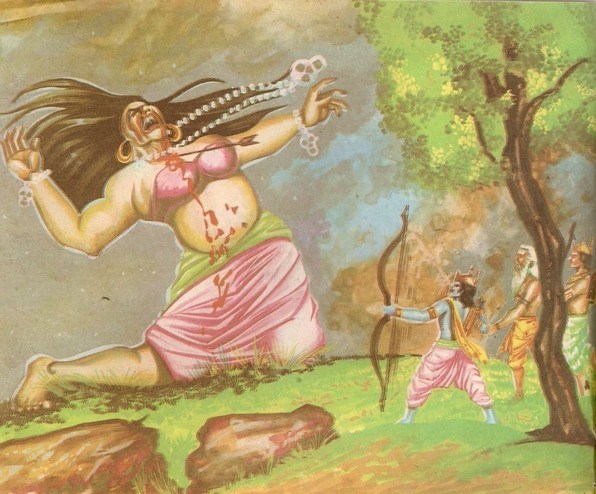At dawn, the valiant Rama and Lakshmana, having completed their morning rites, followed Sage Vishvamitra to the sacred banks of the Ganges. There, a gathering of sages brought forth a small but sturdy boat, adorned with seasonal flowers, fragrant creepers, and verdant leaves, a sight pleasing to the eye. “O great sage,” they humbly said, “please board this boat along with Rama and Lakshmana. The passage across the waters will ease the strain of time.”
Blessing the sages, Vishvamitra, with the two princes, embarked upon the boat. As they sailed upon the river, the sage gazed at the wide expanse, his eyes reflecting the myriad hues drawn from the five elements and the lush greenery surrounding them. The gentle rhythm of the waves stirred the mind, like a dance in harmony with nature’s pulse.
In the heart of the river, Rama heard a strange sound, a booming echo, rising and falling as if from within the waters. Curious, he turned to the sage and asked, “What causes this mysterious noise, O revered one?”
Vishvamitra, smiling, replied, “This river, dear Rama, flows from the sacred peaks of Mount Kailasa, born from the mind of Lord Brahma during a moment of profound peace. It is called ‘Manasa Sarovar,’ the Lake of the Mind. From its pure source springs the Sarayu, the river that graces the land of Ayodhya. Here, at its confluence with the mighty Ganges, the waters clash in a sacred tumult before they settle, washing away the impurities of the mind and spirit of any who bathe with sincere devotion.”
As the boat reached the southern bank of the Ganges, Rama observed the desolate wilderness before them. The land was untrodden by man, its stillness broken only by the unsettling sounds of wild beasts and whistling insects. He turned to Vishvamitra and asked, “What is this forest, so full of ominous life yet devoid of human presence?”
The sage, pleased by their attention to nature’s mysteries, said, “Long ago, this land was the realm of two prosperous kingdoms, Malada and Karusha. These lands thrived until the time when Indra, burdened by the sin of slaying Vruttasura, lost his divine radiance. To cleanse him, the gods and sages gathered the waters from all rivers and, through sacred rites, performed an ablution that restored his brilliance. Grateful, Indra blessed these lands with peace and prosperity.”

Vishvamitra’s tone grew grave as he continued, “But a dreadful demoness, Tataka, descended upon these lands, a Yaksha of immense power. She was the wife of Sunda, a mighty demon, and the mother of Maricha, both formidable and fierce. After Sunda was destroyed by the great sage Agastya, Tataka, in her fury, began to ravage these lands. Agastya cursed her to assume a monstrous form, and since then, she has terrorized this forest, feasting on its creatures and men alike.”
Rama, intrigued, asked, “O sage, I have heard that yakshis are gentle beings. How is it that Tataka, a woman, possesses such terrifying strength?”
“Ah, Rama,” Vishvamitra replied, “In ancient times, a noble yaksha performed severe penance, and Brahma granted him a daughter, Tataka, who was endowed with the strength of a thousand elephants. Though beautiful, she might led her to marry Sunda, and together they wreaked havoc upon this land. Only you, Rama, can defeat her. A king must protect the innocent and uphold righteousness, even if it means striking down such a creature.”
Rama, with unwavering resolve, said, “O sage, my father, King Dasaratha, has entrusted me to follow your command. I shall obey your will.”
With that, he readied his bow and, with a swift twang, sent a sound reverberating through the forest. The very air quivered with the force of it, striking terror into the heart of Tataka, who enraged, rushed toward them. Her monstrous form loomed like a mountain, her face twisted in fury, her mouth dripping with blood.
Vishvamitra cried out like a lion, startling the demoness, and Rama swiftly loosed an arrow that struck her arm, crippling her. Lakshmana, with great precision, severed her nose and ears, but instead of fleeing, Tataka, now more furious than ever, summoned a storm of rocks and dust, darkening the sky. Undeterred, Rama drew another arrow, and as Vishvamitra urged him not to hesitate, he pierced Tataka’s forehead with a powerful strike. The demoness fell, lifeless, to the ground, her massive form covering the earth.
The gods, sages, yakshas, kinnaras, and Gandharvas rejoiced, blessing Rama and Lakshmana for their victory. They prayed to Vishvamitra, requesting him to bestow upon the princes the knowledge of divine weapons. The sage agreed, and that night, after a peaceful rest, he began the sacred transfer of celestial arms to the two warriors.
With solemn chants, Vishvamitra bestowed upon them the mighty Astra and Shastra—Dharma Chakra, Vishnu Chakra, Indra’s thunderbolt, Agneya, Brahmastra, and many more, each with the power to protect the world and defeat its evils. Rama and Lakshmana, fully armed with these celestial weapons, prayed to their divine origins to guide and aid them in future battles.
Thus prepared, they set out with Vishvamitra, ready to face the forces of darkness that threatened the balance of the universe.





